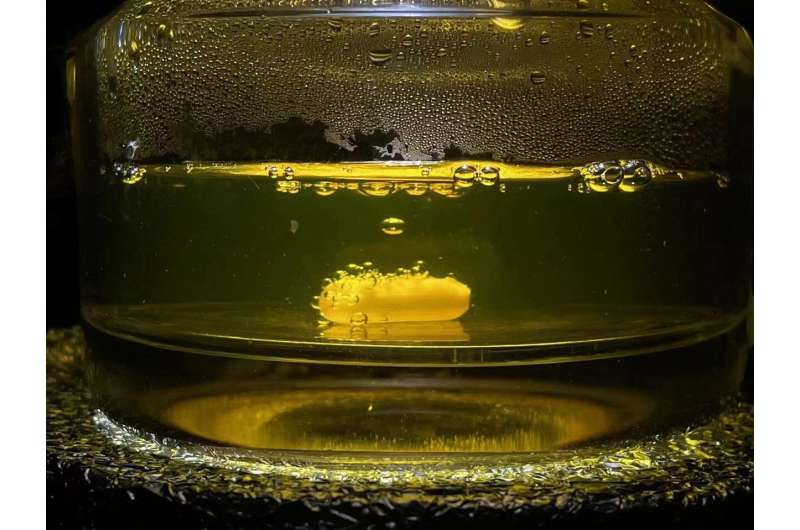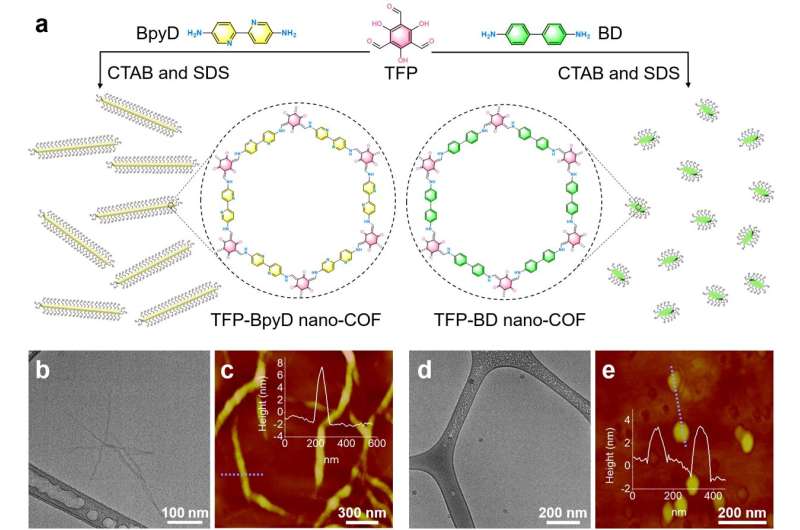
Have you ever ever thought-about how nanotechnology might rework our method to scrub power? In current analysis, we have been exploring nanoscale covalent natural frameworks (nano-COFs) that present distinctive potential for enhancing photocatalytic hydrogen manufacturing.
This research examines the synthesis and efficiency of those nano-COFs, paving the way in which for extra environment friendly and sustainable hydrogen power options. The research is revealed within the journal Nature Communications.
Excessive energetic efficiency
Our research focuses on the synthesis and characterization of two particular nano-COFs, TFP-BpyD and TFP-BD, which exhibit exceptional exercise in photocatalytic hydrogen manufacturing.
By lowering COF crystals to the nanoscale utilizing surfactants, we have achieved considerably improved water dispersibility and light-harvesting properties. These developments have led to spectacular efficiency metrics, with one nano-COF demonstrating a hydrogen evolution charge of 392.0 mmol g−1 h−1. This charge is among the many highest mass-normalized charges reported for any natural photocatalyst.

Reverse concentration-dependent photocatalytic phenomenon
Other than the nanosizing of COF crystals enhancing their photocatalytic properties, one of many fascinating outcomes of our analysis is the reverse concentration-dependent photocatalytic phenomenon noticed, the place greater photocatalytic exercise is recorded at decrease catalyst concentrations.
This consequence challenges the traditional knowledge that extra catalyst normally equates to greater exercise, suggesting that there are optimum circumstances for probably the most environment friendly operation of those nano-COFs.
Moreover, we have delved into the molecular excitonic nature of those nano-COFs, investigated by photoluminescence and transient absorption spectroscopy. This molecule-like excitonic conduct, a direct results of the nanoscale dimensions of the COFs, contributes considerably to their enhanced photocatalytic efficiency.
In abstract, the nanosizing of COFs to create nano-COFs represents a major development within the area of photocatalytic hydrogen manufacturing. These supplies not solely exhibit improved water dispersibility and light-harvesting properties but additionally show distinctive hydrogen evolution charges.
The invention of the reverse concentration-dependent photocatalytic phenomenon provides an thrilling dimension to the optimization of those supplies.
Our analysis highlights the potential of nano-COFs to function extremely environment friendly natural photocatalysts for photo voltaic gasoline manufacturing. The way forward for sustainable power options could effectively lie within the revolutionary use of nanoscale supplies like these nano-COFs.
This story is a part of Science X Dialog, the place researchers can report findings from their revealed analysis articles. Go to this web page for details about ScienceX Dialog and the right way to take part.
Extra data:
Wei Zhao et al, Nanoscale covalent natural frameworks for enhanced photocatalytic hydrogen manufacturing, Nature Communications (2024). DOI: 10.1038/s41467-024-50839-3
Wei Zhao obtained his Bachelor’s diploma in 2015 from Hunan College. Then, he earned his MS diploma in 2018 from Sichuan College underneath the steerage of Prof. Xikui Liu. He then moved to the College of Liverpool, the place he efficiently obtained his PhD in 2022 underneath the supervision of Prof. Andrew I. Cooper. Wei is at the moment furthering his analysis and experience as a analysis fellow in Prof. Dan Zhao’s group on the Nationwide College of Singapore. His analysis pursuits concentrate on the synthesis and functions of covalent natural frameworks, comparable to photocatalysis and sorption
Quotation:
New nanomaterials might increase hydrogen manufacturing for clear power (2024, August 5)
retrieved 19 August 2024
from https://phys.org/information/2024-08-nanomaterials-boost-hydrogen-production-energy.html
This doc is topic to copyright. Other than any truthful dealing for the aim of personal research or analysis, no
half could also be reproduced with out the written permission. The content material is offered for data functions solely.